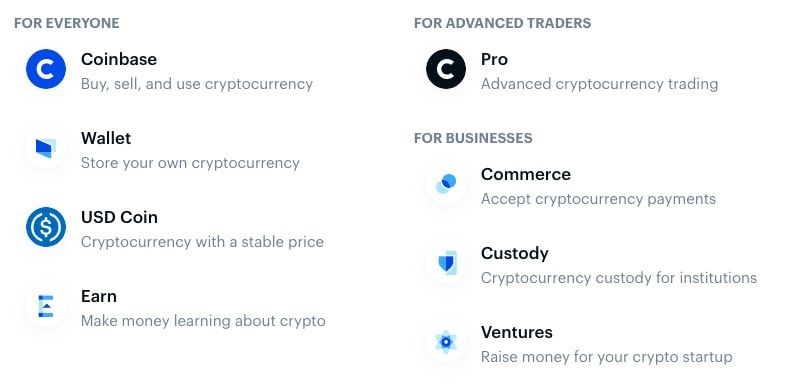UPDATE: Which are the best exchanges THIS YEAR? Top Best Cryptocurrency Exchanges (2023)
For this article, exchanges that we at Team Boxmining use frequently are listed in Tier 1, exchanges we occasionally use are listed in Tier 2, down to those which we seldom or do not use at all are listed in Tier 3. However, this is only based on our personal preference. Potential users should also always check if the exchange is supported in their country and if there are any geographical restrictions.
Check out our latest video where we talk about our picks for the best cryptocurrency exchanges in 2022:
Tier 1 Exchanges (Active Trading)
Binance
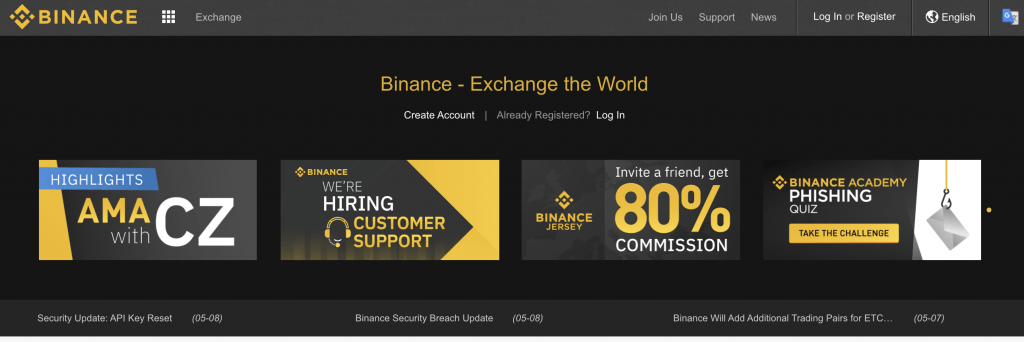
Binance was founded in 2017 and currently serves over 13.5 million active users across the globe. Unlike Coinbase and Kraken, Binance supports a wide range of altcoins (i.e. cryptocurrencies other than Bitcoin). This attracts more people to transfer their Bitcoin, Bitcoin Cash, and Litecoin from other exchanges to Binance to explore the altcoin world.
It is suited for entry-level crypto traders due to its huge array of tradable cryptocurrencies. Binance supports trading of over 400 different types of cryptocurrencies with more being added almost every week. In fact, Binance has become so popular as a cryptocurrency exchange that the mere news of new coins being listed can cause the tokens’ prices to skyrocket.
The popularity of Binance has made its CEO Zhao Changpeng (CZ) a personality in the cryptocurrency community. His words/actions now have a significant influence on the cryptocurrency markets.
Cryptocurrencies can be purchased on the Exchange through a variety of ways: PayPal, bank transfer, credit card, and debit card (although they charge a substantial 4.5% fee). It is worth noting, however, that users cannot simply exchange their US dollars for cryptocurrencies. Nevertheless, the aforementioned purchase methods should be sufficient for most cryptocurrency traders.
As for security measures, Binance has an asset fund as insurance in case of misappropriated user funds and also provides two-factor authentication.
Binance also has its own native token- BNB, which ranks 4th in terms of trading volume. The token can be used for various features and discounts on the exchange.
Binance does have a US version of its exchange at Binance.US. Although Binance.US will have fewer cryptocurrencies available for trading and features in order to be compliant with US regulations.
Binance is Team Boxmining’s second most frequently used exchange. It is easy to use, their customer service team is very responsive, and Binance is credited with pioneering many of the special features we come to expect today such as Initial Exchange Offerings (IEOs).
Binance also caters to experienced traders with advanced trading options and plenty of analytics. Novice users will inevitably experience a learning curve, but once you find your way around, it becomes almost second nature. (softlay.com)
Check out Binance Exchange Review: Best Crypto Exchange? For a detailed look at what Binance has to offer.
KuCoin
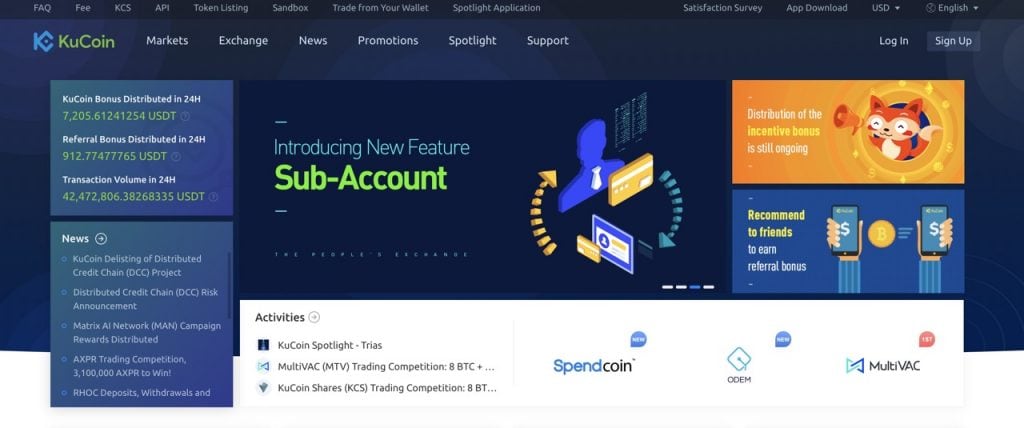
KuCoin has unique assets and an extensive list of tradable coins. The Exchange is highly regarded for its large number of different cryptocurrency pairs, which means users can purchase a wide variety of cryptos.
KuCoin supports over 500 cryptocurrencies which means you can trade lots of small-cap tokens with low trading fees. At team Boxmining, we find that if we want to trade small-cap coins, we need to use MetaMask and then trade on different platforms and DEXs. And if it’s an ERC 20 token you would have to pay ridiculously high gas fees which is not economical. So, if these small-cap tokens are already on KuCoin, then you can save a lot of unnecessary costs.
KuCoin also allows you to use trading bots through their mobile app which automatically buy and sell your cryptocurrencies so you don’t have to follow the market 24/7. However, it’s not always clear how they’re investing your money, so you still need to understand the cryptocurrency trading strategies they use.
On the downside, KuCoin has in the past been plagued by poor Know-Your-Customer (KYC) procedures. At first, it allowed traders to deposit and withdraw large amounts of Bitcoin i.e. 50 Bitcoin per day without providing personal details. They have since changed their KYC policies and now you can only withdraw up to 2 Bitcoin per day without a “Verified” account i.e. an account that has completed the KYC procedures.
In addition, Kucoin is a crypto-only exchange, which means you will need another exchange for buying cryptocurrencies with fiat currency such as HKD, USD or CAD. That means Kucoin is not the most ideal option for newcomers to cryptocurrency, but if you are an experienced trader then KuCoin is a great way to diversify your cryptocurrency portfolio.
SwissBorg

SwissBorg was launched in December 2017, as per their name they are based in Switzerland and are fully compliant with Swiss Law, making them hugely popular amongst Europeans. The Exchange is available in over 100 countries (although currently not supported in the US), and it is noted the full range of features offered by SwissBorg may not be available in every country.
SwissBorg supports over 35 cryptocurrencies and 16 fiat currencies. New cryptocurrencies are continuously being added and users can vote for the next one to be listed. Users can directly fund their SwissBorg accounts via bank transfer with 0 charges.
Another popular feature is SwissBorg’s app which allows users to access their crypto wallets and trade on the go.
To keep ahead of the yield farming and decentralized finance (DeFi) craze, SwissBorg offers their Smart Yield account for yield farming, which allows users to get exposure to farming without much prerequisite knowledge. The Smart Yield feature does this by scanning and finding a range of DeFi and CeFi (Centralized Finance).
SwissBorg also has a native token $CHSB- a multi-utility token that entitles holders to lower fees when buying/selling Bitcoin, CHSB and stablecoins on the Exchange. Other benefits include being able to have a 2x yield on your USDC, BTC, ETH, XRP, and CHSB holdings.
Learn more about SwissBorg with our in-depth guide- SwissBorg ($CHSB): What is it?
Sign up for SwissBorg with our exclusive link to get FREE CHSB!
Coinbase

Coinbase was launched in 2012 and currently has over 30 million users spanning 103 countries. While Coinbase may not offer a wide variety of cryptocurrencies, it is still a top favorite among many investors due to its highly secure and easy-to-use platforms. Also, Coinbase is the first stop for many beginner traders (especially those from the US) as they have a very easy-to-use mobile app, and you can directly fund your Coinbase account from your bank account. Coinbase is also particularly popular in the US since it is the first publicly listed US crypto exchange and it is fully compliant with US regulations.
Coinbase’s popularity stems from the fact that its platform has one of the fastest and easiest cryptocurrency buying processes, which along with their claim to have never been hacked, makes them an ideal choice for beginners. Advanced users can also opt for Coinbase Pro, which has more trading features.
Coinbase supports hundreds of digital currencies, but nevertheless still loses out to other major crypto exchanges in this respect. For US customers, there are no restrictions on transacting the following cryptocurrencies:
- Bitcoin (BTC);
- Ethereum (ETH);
- Litecoin (LTC);
- Bitcoin Cash (BCH);
- Ethereum Classic (ETC); and
- Ripple (XRP).
Here’s a chart of the cryptocurrencies supported by Coinbase depending on your location.
Most common forms of payment are accepted by Coinbase, for example credit and debit cards.
Whilst it is generally secure, Coinbase has been under fire recently for suffering outages when there were huge fluctuations in the prices of Bitcoin in March, April AND May 2020. These outages left many users powerless to do any trades when they needed to the most. Potential users should bear this issue in mind when considering whether or not to use Coinbase.
Coinbase also charges higher fees compared to most other exchanges, charging $0.99-$2.99 per purchase under a $200 transaction and an additional 0.5% fee depending on the amount traded. However many novice or infrequent traders consider this a fair price to pay for the convenience of the platform and as it is one of the few exchanges available to US users.
Check out our Coinbase review for an in-depth look at this exchange. And as mentioned, Coinbase does charge higher fees compared to other exchanges on the market, hence we have our popular guide- Coinbase Fees: How to Avoid Them.
Tier 2 Exchanges (Seasonal Trading / specific coins)
PrimeXBT

PrimeXBT is also one of the newer players in the cryptocurrency exchange space, having been launched in 2018. Credit is given to this Exchange for being one of the most transparent we have come across. Their website is a one-stop resource for anything you wanted to know about the Exchange and they also have in-depth tutorials on how to use its various features.
The Exchange is lacking a bit in supported cryptocurrencies, currently, they only support 7 cryptocurrencies: BTC, ETH, USDC, USDT, LTC, XRP and EOS. In addition, only withdrawals and deposits in BTC are supported. However, what they lack in cryptocurrency support they make up in ability to trade other asset types such as commodities, stock indices and Forex.
The ability to customise your trading screen and annotate charts is probably something long-awaited by technical analysts and serious traders and will keep them coming back to the Exchange.
Check out our PrimeXBT review and guide.
Kraken

Kraken has a substantial presence in Europe, and listed cryptos have fiat pairs. It was founded in 2011 then relaunched in 2013. Kraken offers trading in over 50 cryptocurrencies- full list here. However, some cryptocurrencies are not available in specific countries.
Kraken also offers margin trading and futures trading. With its margin accounts, you can borrow up to five times your account balance to trade crypto assets. Futures trading — contracts which allow you to buy or sell an asset at a set price on an upcoming date — is available for Bitcoin, Ethereum, Litecoin, Bitcoin Cash, and Ripple.
Learn more about futures trading with our Futures Trading Guide.
The Exchange also offers its own futures trading platforms. But institutional clients can take advantage of expert insights, one-on-one consultations, account management support, and more.
Kraken is hugely popular amongst European cryptocurrency enthusiasts due to its range of features.
Bittrex
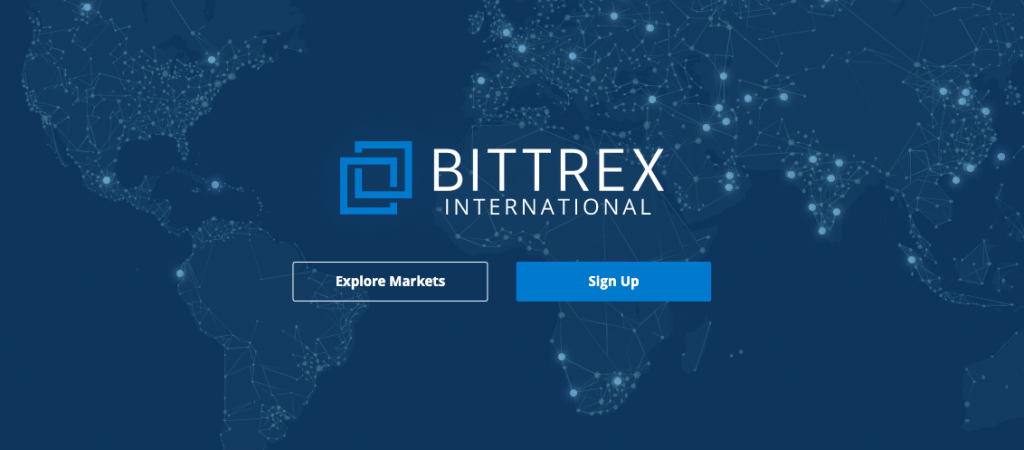
Bittrex is reliable and offers reputable services. Bittrex I used extensively in the past because they listed lots of coins. However, I eventually moved away from Bittrex because Binance overtook them in terms of coin selection.
Bittrex will be removing the following markets after 31 May 2019: BTC-COVAL, BTC-SALT AND BTC-XCP. And the following markets after 6 July 2019: BTC-LUN, BTC-NEOS, BTC-THC and BTC-TKS
Poloniex
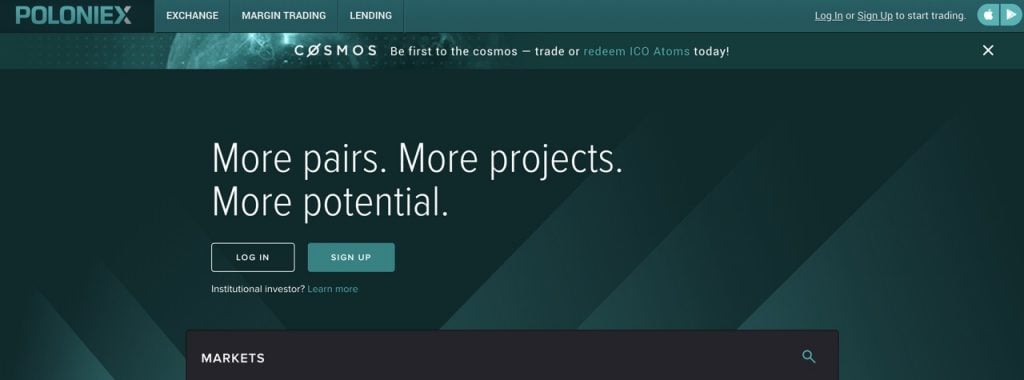
I also used Poloniex extensively in the past. However in my experience, their Know Your Customer (KYC) process took a long time. In my case it took 3 months to complete. This was unacceptable especially when it was during the bull market.
Customer support on Poloniex isn’t terrible, so they still seem to be a good exchange.
However if you are a U.S. citizen, you may need to be aware of Poloniex geofencing assets for U.S. customers. On 29 May 2019, the markets for ARDR, BCN, DCR, GAME, GAS, LSK, NXT, OMNI and REP will be disabled for US customers.
Once the market has been geofenced, customers can still withdraw those tokens from their wallet so long as Poloniex supports it globally. However, customers will not longer be able to see their deposit address or generate a new deposit address.
Huobi, OKEx
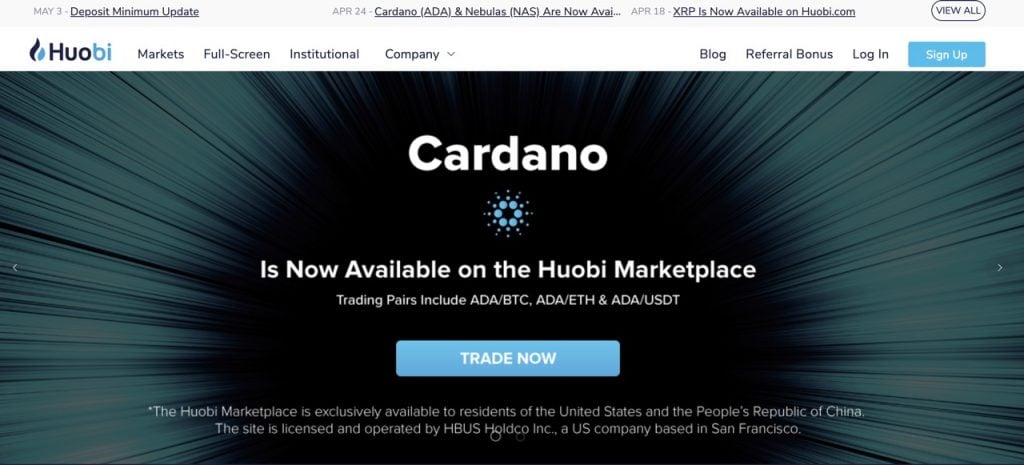
Huobi and OKEx were the main titans of China. They had lots of Chinese users before the Chinese government cracked down on cryptocurrency trading in the country.
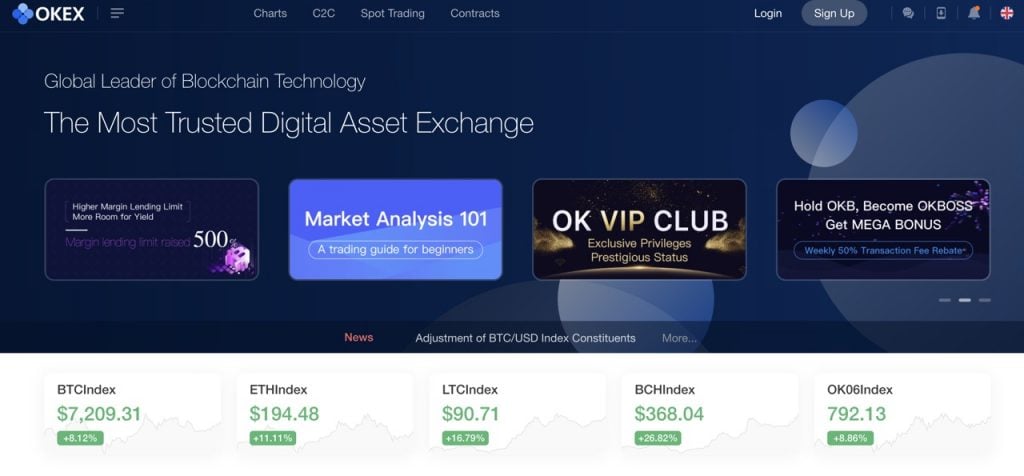
This was known as the “Golden Vacuum” since it obliterated a lot of Huobi and OKEx’s dominance. This destabilized the two exchanges giving way to others like KuCoin and Binance to take charge.
We still consider them as Tier 2 exchanges because they still hold onto some of their past customers and because they have the technology for the future.
There are rumours that the Chinese government allows these exchanges to operate but keeps tabs on their transactions.
BitMEX
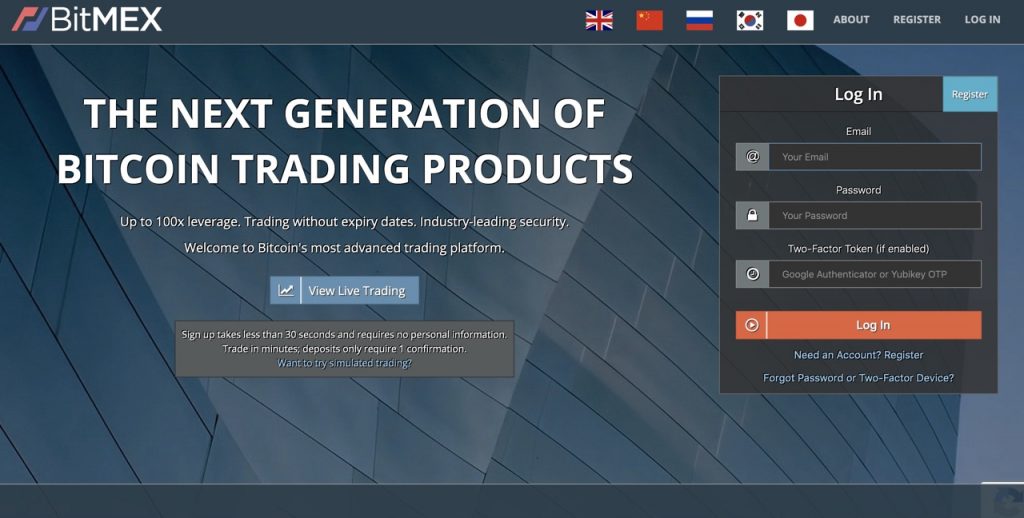
BitMEX is mostly a margin trading exchange allowing enormous leverage (i.e. up to 50 times). Leverage trading is when you do not own the physical bitcoin but you own trading contracts.
Unfortunately, BitMEX does not operate in the United States and be careful not to login to your BitMEX account there, your account will get banned.
Although we have heard of some Americans that use VPNs (Virtual Private Networks) to mask the country of origin so as to bypass this restriction.
This is NOT recommended.
BitMEX has poor customer support. It took us 3 months of emails to unban our account when we accidentally logged into BitMEX in the United States.
Tier 3 Exchanges (Possible risks / issues)
Bitfinex

Although Bitfinex is a reputable exchange, its recent struggle with the New York Attorney General for US$850 million loss of customer funds lowers its credibility. We will have to see how Bitfinex will overcome this struggle.
Apart from the case, it has a strong BTC/USD trading pair.
To stay up to date with what is happening at Bitfinex, click here.
OceanEx
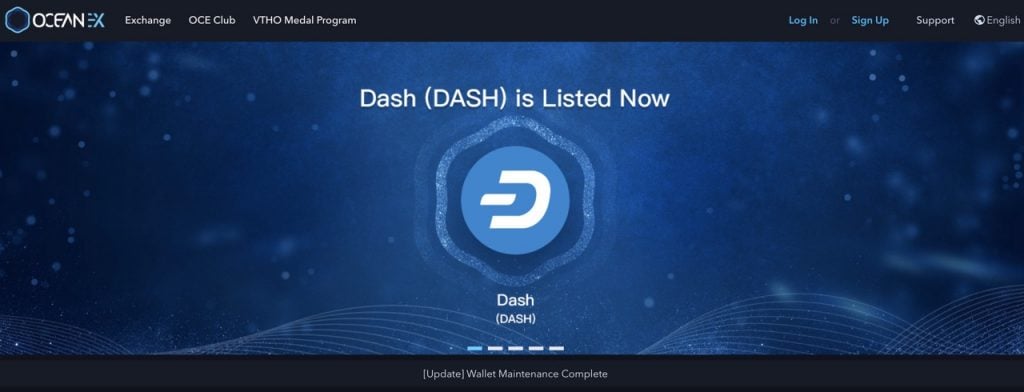
OceanEX is launched by BitOcean Global, a fully registered and licensed trading paltform in Japan. It’s created by a core team of members with past experience from Morgan Stanley, BNP Paribas, and Deloitte. OceanEX boasts a host of AI security features to improve user and trading safety. OceanEX is the trading hub of the VeChainThor Ecosystem, with all VeChain assets listed and VeChain trading pairs. Whilst it has many attractive features, we found liquidity lacking on many assets and difficulties both buying and selling various coins.
To learn more about VeChain and its ecosystem, check our Vechain guide.
AscendEX (formerly known as BitMax)

I tried this exchange since I received a lot of requests from viewers.
However I am skeptical of exchanges that use the “Transaction Mining” model. Transaction Mining is where you gain credits or exchange tokens in return for trading.
This directly incentivises wash trading on the platform, which is where a trader simultaneously sells and buys the same assets.
This in turn creates misleading reports on the trading volumes on the exchange.
Tier 4 Exchanges (avoid these exchanges)
HitBTC
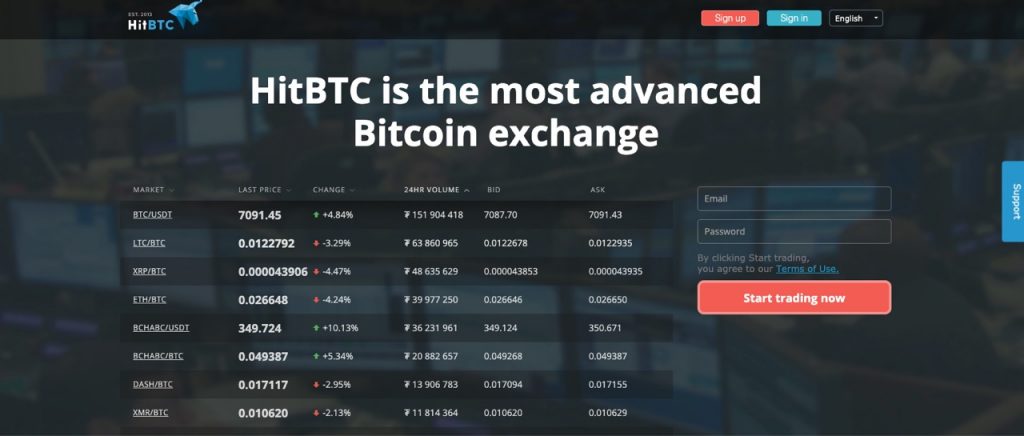
These three exchanges have very questionable practices.
For example, HitBTC does not have a real KYC policy. They do not seem to have much issue with you depositing large amounts of funds. However if you trade or want to withdraw a lot they will just ban or suspend your account until you communicate with them. This has happened to me personally and when we researched this and found that many others had the same experience.
Lately there has been a new wave of users complaining about having to provide excessive detail about the source of their funds.
There are also some users who have done their own investigations and concluded that the Exchange is insolvent.
YoBit
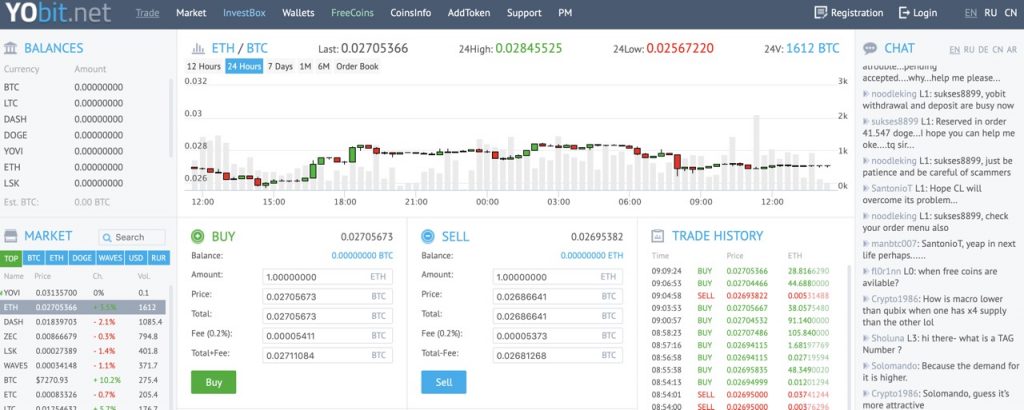
The exchange has a troublesome withdrawal process.
Conclusion
Tier 1: Binance, KuCoin, SwissBorg, Coinbase
Tier 2: PrimeXBT, Kraken, Bittrex, Poloniex, Huobi and OKEx, BitMEX
Tier 3: Bitfinex, OceanEx, AscenDEX (formerly BitMax),
In conclusion, conducting a background check on a cryptocurrency platform before signing up is the best way to avoid losing your digital wealth. Following the above list is one huge step towards this goal.
Disclaimer: Cryptocurrency trading involves significant risks and may result in the loss of your capital. You should carefully consider whether trading cryptocurrencies is right for you in light of your financial condition and ability to bear financial risks. Cryptocurrency prices are highly volatile and can fluctuate widely in a short period of time. As such, trading cryptocurrencies may not be suitable for everyone. Additionally, storing cryptocurrencies on a centralized exchange carries inherent risks, including the potential for loss due to hacking, exchange collapse, or other security breaches. We strongly advise that you seek independent professional advice before engaging in any cryptocurrency trading activities and carefully consider the security measures in place when choosing or storing your cryptocurrencies on a cryptocurrency exchange.




